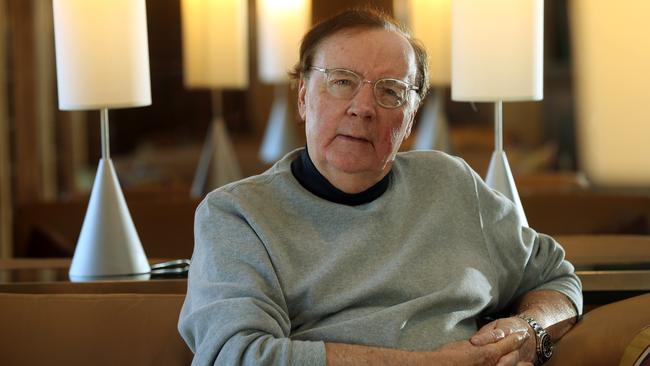James Patterson takes a personal approach to book blurbs
Blockbuster American author James Patterson has taken an unconventional approach to the blurb for his latest book.

A PAIR OF RAGGED CLAWS: Cover blurbs on books are a tricky business. Some star authors provide a lot of them. Others are more frugal. Personally, I don’t think the regular blurbers or the irregular ones are making it up. If Tom Keneally says a book is good, there’s a high chance it is. Same goes with, say, Martin Amis. Well, blockbuster American author James Patterson has gone one better and received a blurb from the very best: himself. “My new book, The Black Book, is better than Kiss the Girls and Along Came a Spider,” he announced on social media. His self-blurb has been incorporated into some of the PR for the just-published book. And who can argue with Patterson, 70, who has sold so many millions of books that he features in another well-known one, Guinness World Records? He is also a generous financial supporter of literacy programs that reach from preschools to universities.
Yes, I know it’s April 1. Is Patterson a joke? Certainly not! But with the date in mind I did think twice about a few arrivals this week, such as The Little Book of Bogan Baby Names, by Sabrina Rogers-Anderson (New Holland, $14.99). Why publish a book full of bogan names? According to the press material it’s a self-help manual: “Those who come from a longstanding bogan background might use this book as inspiration for the next baby and there’s certainly no shame in that. Bogan and proud!” Non-bogans, in turn, will enjoy “a good chuckle over crazy baby names”. So, something for everyone, Jawns and Johns, Caughtnays and Courtneys.
Clair Brown’s Buddhist Economics (Bloomsbury, $32.99) sounds like an oxymoron, but perhaps that’s the point. We in the liberal West think of the economy as the driver of our personal wealth. Where’s the capital gain in meditation? Brown’s book, subtitled An Enlightened Approach to the Dismal Science, offers a holistic economic model where human values take priority over financial ones. I admit I went straight to the index to find “How to be a Buddhist billionaire”. No luck, but thinking of rich yogis did make me realise there is one word that can be used to link the bogan book and the Buddhist one: Sting.
As you read this I’ll be on a week’s holiday. No joke there, I assure you. There will be no column next week but it will be back on April 8. I will leave you with a brief list of novels I’ve read in the past few weeks that I highly recommend. Jane Harper’s debut crime fiction The Dry, which just won the Indie Award, is first rate. Emily Maguire’s An Isolated Incident and Michael Sala’s The Restorer are brilliant psychological thrillers that explore the darker sides of families. All three books consider the relationship people have with their communities. There’s an intensity that is sometimes subtle, sometimes brutal. And when it comes to a family where there’s more than meets the eye, German novel Fear, by Dirk Kurbjuweit, is a cracker. I was drawn to it by the back cover blurb: “I had always believed my father capable of a massacre.” The gun-loving father is unusual, yes, but the more we learn about his son, a Berlin architect, the more the novel turns, in surprising and unsettling ways. Finally, Syd and I are loving James Bradley’s debut young adult novel The Silent Invasion. Coming with me on holiday are David Vann’s Bright Air Black, Colm Toibin’s House of Names, Laurent Binet’s The 7th Function of Language, Brian Van Reet’s Spoils and, last but far from least, Ashley Hay’s A Hundred Small Lessons. More on them anon.




To join the conversation, please log in. Don't have an account? Register
Join the conversation, you are commenting as Logout